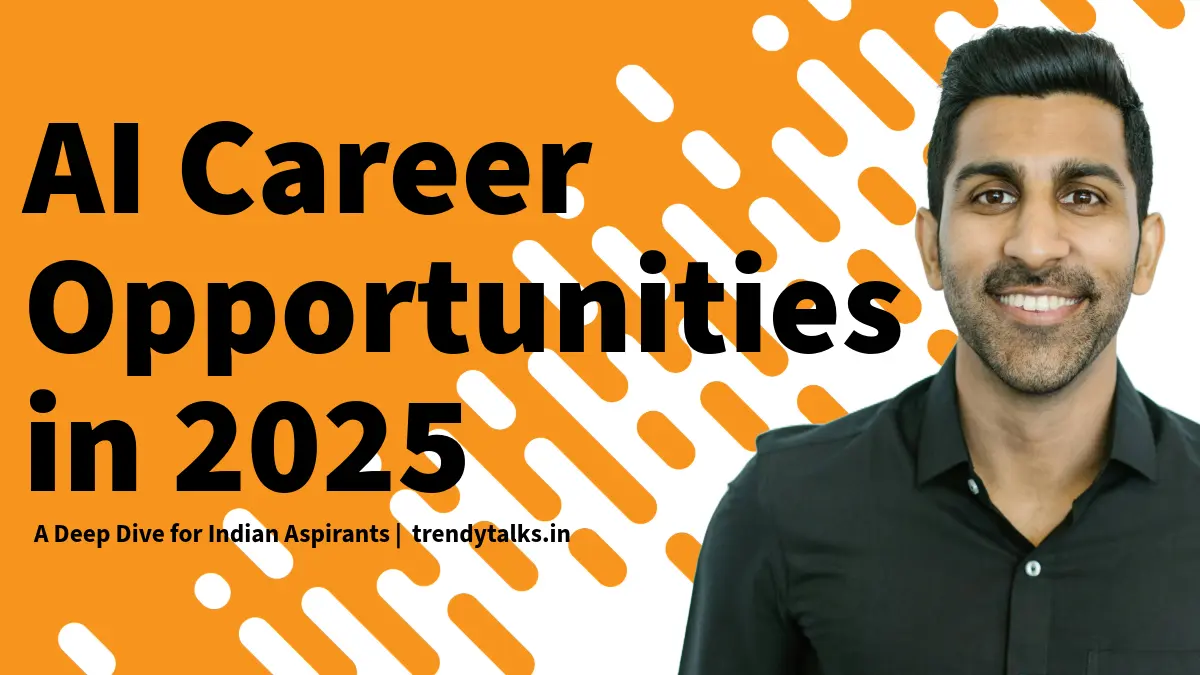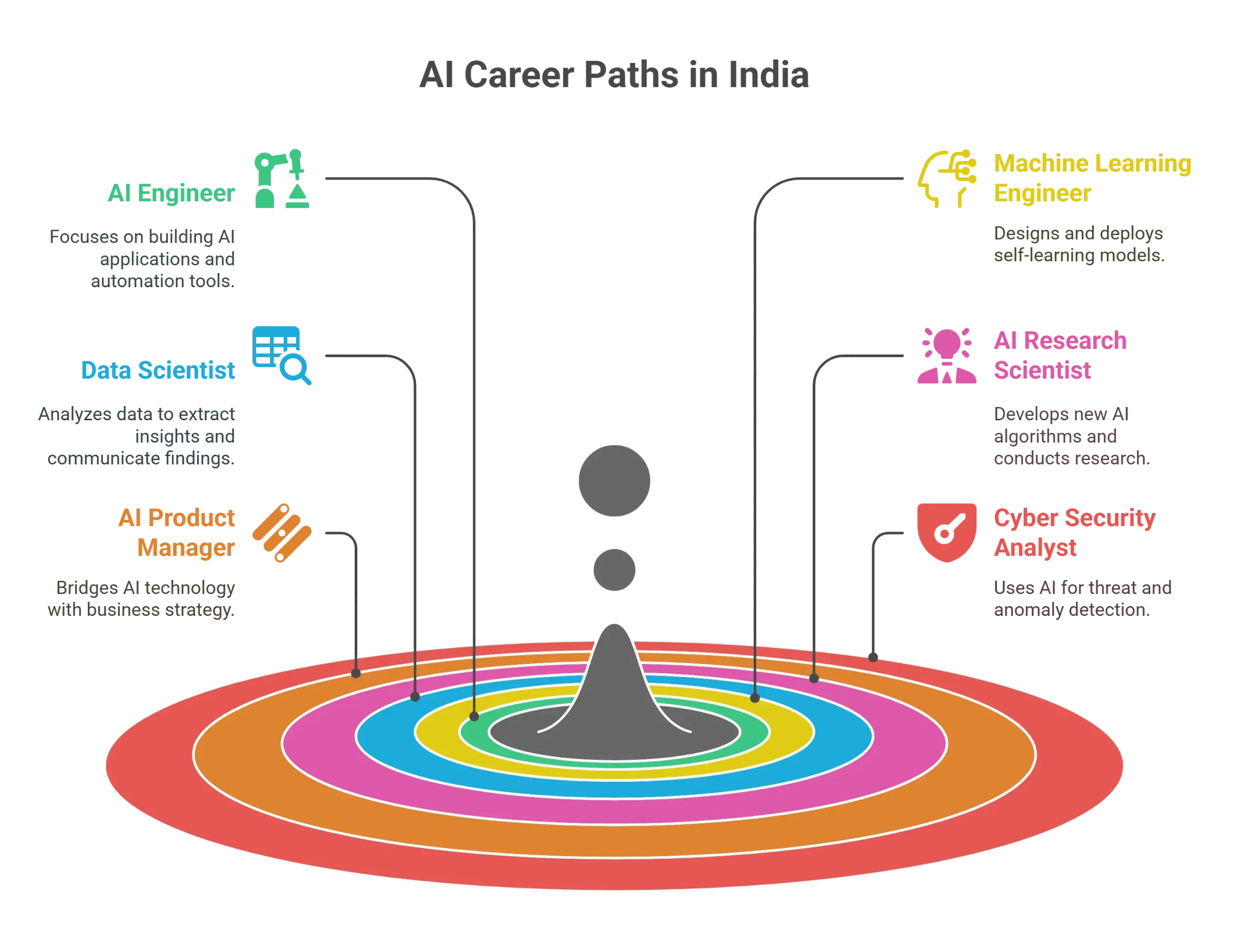
Artificial Intelligence (AI) is no longer just a buzzword; it’s a transformative force reshaping industry across India. From revolutionizing healthcare diagnostics to optimizing agricultural practices, AI’s impact is undeniable. This surge in adoption is creating a wealth of career opportunities for skilled professionals. If you’re an Indian aspirant eager to carve a niche in this dynamic field, this guide will provide you with a comprehensive roadmap.
Understanding AI: Beyond the Basics
AI empowers machines to mimic human intelligence, enabling them to learn, reason, and solve problems. Machine learning (ML), a subset of AI, allows machines to learn from data without explicit programming. Key AI applications in India include:
- Healthcare: AI is enabling faster and more accurate disease detection, tailored therapies designed for individual needs, and proactive health management through risk prediction.
- Finance: Fraud detection, algorithmic trading, and AI-driven chatbots for customer service.
- Automotive: Autonomous vehicles, traffic management systems, and enhanced road safety.
- E-commerce: Personalised recommendations, demand forecasting, and automated warehouse operations.
- Agriculture: Precision farming, crop monitoring, and weather prediction.
Top AI Career Paths in India: A Detailed Look

Here’s a more nuanced breakdown of promising AI career paths:
AI Engineer:
- Role: Building AI-driven applications, automation tools, and chatbots. Proficiency in ML frameworks is essential.
- Skills: Python, TensorFlow, PyTorch, scikit-learn, cloud computing (AWS, Azure, GCP), MLOps knowledge.
- Salary: ₹635,280 to ₹1,270,560 (entry-level), potentially up to ₹5,294,000 (senior).
Machine Learning Engineer:
- Role: Designing and deploying self-learning models, understanding supervised, unsupervised and reinforcement learning.
- Skills: Python, ML algorithms, deep learning, data preprocessing, model evaluation.
- Salary: ₹741,160 to ₹1,164,680 (entry-level), potentially up to ₹6,352,800 (senior).
Data Scientist:
- Role: Analyzing large datasets, extracting insights, and communicating findings to stakeholders.
- Skills: Python, R, SQL, statistics, data visualisation (Power BI, Tableau), ML.
- Salary: ₹635,280 to ₹1,058,800 (entry-level), potentially up to ₹5,294,000 (senior).
AI Research Scientist:
- Role: Developing new AI algorithms, conducting research, and publishing papers.
- Skills: Advanced mathematics, neural networks, deep learning, NLP, computer vision, strong research skills.
- Salary: ₹1,058,800 to ₹1,588,200 (entry-level), potentially up to ₹8,470,400 (senior).
AI Product Manager:
- Role: Bridging the gap between AI technology and business strategy.
- Skills: AI concepts, product management, business acumen, project management.
- Salary: ₹1,270,560 to ₹1,588,200, potentially up to ₹7,411,600.
Cyber Security Analyst (AI-Powered):
- Role: Using AI for threat detection, anomaly detection, and security automation.
- Skills: Cyber security, AI for threat detection, Python, cloud security.
- Salary: ₹847,040 to ₹1,270,560, potentially up to ₹5,294,000.
Note: Salary ranges vary based on experience, location (e.g., Bangalore, Mumbai), and industry.
Getting Started in AI: A Practical Roadmap
- Build a Strong Foundation:
- Master Python, mathematics, and statistics.
- Explore online courses on platforms like Coursera, edX, and Udacity.
- Learn about fundamental AI concepts and ML algorithms.
- Gain Hands-on Experience:
- Work on personal AI projects and contribute to open-source projects (e.g., scikit-learn, TensorFlow).
- Participate in hackathons and coding competitions.
- Learn MLOps practices.
- Create a Portfolio: Showcase your AI projects and accomplishments on GitHub or a personal website.
- Network and Connect:
- Attend AI conferences and meetups.
- Join online AI communities.
- Apply for Internships and Jobs: Seek out entry-level AI positions and internships.
Addressing Key Challenges
- Ethical Considerations: AI professionals must be aware of and address ethical concerns related to bias, privacy, and job displacement.
- Continuous Learning: The AI field is rapidly evolving, requiring continuous learning and skill development.
- Job Market Realities: Entry-level AI jobs can be competitive; building a strong portfolio is essential.
- Data Quality and Availability: Good AI models require good data.
- AI Safety: Understanding and implementing AI safety practices is becoming increasingly important.
Practical Resources
Companies Hiring in India:
Tata Consultancy Services (TCS): Check their careers page for AI and data science roles.
Infosys: Look for positions related to machine learning and AI development on their job portal.
Wipro: Explore their AI and analytics divisions for relevant opportunities.
Reliance Jio: They frequently hire AI engineers for their various digital initiatives.
HCL Technologies: They have AI and machine learning divisions, and are frequently hiring.
Online Learning Platforms
Coursera: On Coursera, you can find highly acclaimed courses like the ‘Deep Learning Specialization’ from deeplearning.ai and the foundational ‘Machine Learning’ course taught by Andrew Ng.
edX: “Artificial Intelligence (AI)” program by Columbia University, “MicroMasters Program in Data Science” by UC San Diego.
Udacity: Udacity offers career-focused training with its ‘Machine Learning Engineer Nanodegree’ and ‘Deep Learning Nanodegree’ programs.
DeepLearning.AI: Offers specialized courses on deep learning and related topics.
Open-Source Projects
TensorFlow (Google): A widely used open-source machine learning framework. Contribute to its documentation or core development.
PyTorch (Facebook): Another popular deep learning framework. Explore its tutorials and contribute to its community.
scikit-learn: A powerful Python library that provides a wide range of tools and algorithms for machine learning. Contribute to its development or create example projects using it.
Keras: A user-friendly, high-level Python API for building and training neural networks.. Build your own neural network projects using Keras.
Networking Opportunities
NVIDIA AI Summit India: Attending this summit can provide valuable insights and networking opportunities.
DataHack Summit: A popular data science and AI conference in India.
Meetup.com: Search for AI and data science meetups in your city.
LinkedIn: Join AI and data science groups and connect with industry professionals.
Emerging Trends
Generative AI: Large language models (LLMs) and generative models are transforming various industries.
Edge AI: Processing AI workloads at the edge of the network for real-time applications.
MLOps: Automating and streamlining the ML lifecycle.
Frequently Asked Question (FAQs)
Aspirants can begin learning AI by:
- Building a strong foundation by mastering Python, mathematics and statistics. They can also explore online courses.
- Gaining hands-on experience by working on personal AI projects and contributing to open-source projects. They can also participate in hackathons and coding competitions.
- Creating a portfolio to showcase AI projects and accomplishments.
- Networking and connecting by attending AI conferences and meetups, and joining online AI communities.
- Applying for internships and jobs: Seeking out entry-level AI positions and internships.
Key ethical concerns facing AI professionals include:
- Bias: AI professionals must be aware of and address ethical concerns related to bias.
- Privacy: AI professionals must be aware of and address ethical concerns related to privacy.
- Job displacement: AI professionals must be aware of and address ethical concerns related to job displacement.
- AI Safety: Understanding and implementing AI safety practices is becoming increasingly important.
For Indian aspirants, starting to learn AI involves:
- Building a strong foundation in Python, mathematics, and statistics, while also exploring online courses on platforms like Coursera, edX, and Udacity.
- Gaining practical experience through personal AI projects, contributions to open-source projects like scikit-learn and TensorFlow, and participation in hackathons. Learning MLOps practices is also beneficial.
- Creating a portfolio on platforms like GitHub to showcase AI projects and accomplishments.
- Networking by attending AI conferences such as NVIDIA AI Summit India and DataHack Summit, as well as joining online communities on LinkedIn.
- Applying for internships and entry-level jobs with companies like TCS, Infosys, Wipro, Reliance Jio and HCL Technologies.
For Indian AI professionals, key ethical concerns include:
- Bias: Addressing ethical concerns related to bias is crucial.
- Privacy: AI professionals must be aware of and address ethical concerns related to privacy.
- Job displacement: It's important to consider and address the ethical concerns related to job displacement.
AI Safety: Understanding and implementing AI safety practices is becoming increasingly important.
Five AI applications in India include:
- Healthcare: For disease detection and personalised treatments.
- Finance: For fraud detection and customer service chatbots.
- Automotive: To create autonomous vehicles and better traffic management.
- E-commerce: For personalised recommendations.
- Agriculture: To enable precision farming and crop monitoring.



